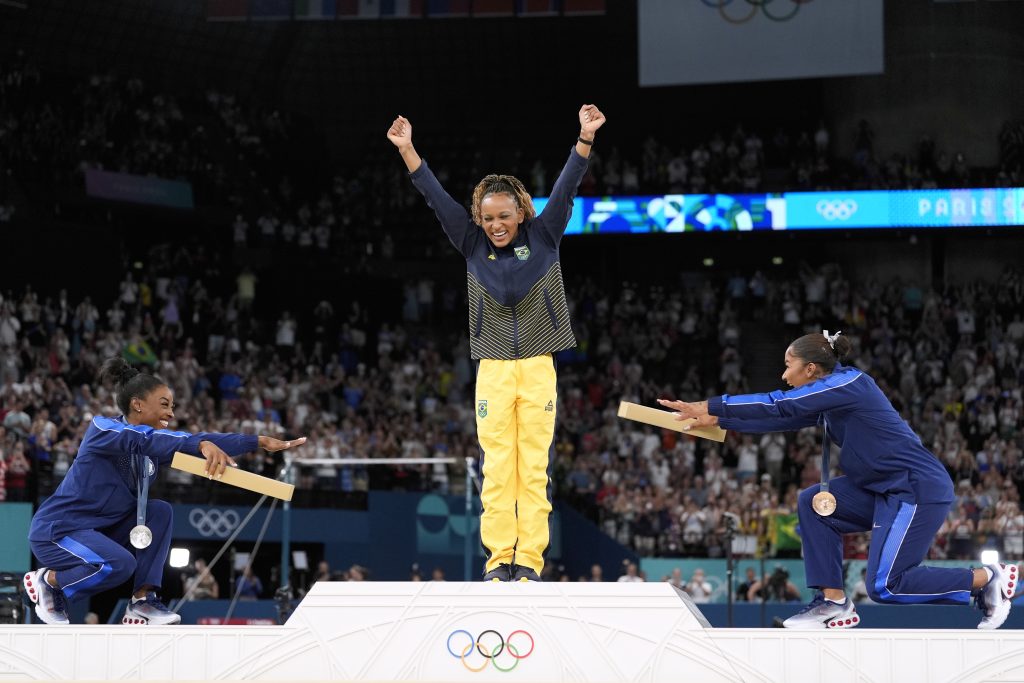The final image of Simone Biles at the Olympics was a symbol of joy — and where the sport is going

Silver medalist Simone Biles, of the United States, left, and bronze medalist Jordan Chiles, of the United States, right, bow to gold medalist Rebeca Andrade, of Brazil, during the medal ceremony for the women's artistic gymnastics individual floor finals at Bercy Arena at the 2024 Summer Olympics, Monday, Aug. 5, 2024, in Paris, France. (AP Photo/Abbie Parr)
By WILL GRAVES AP National Writer
PARIS (AP) — Simone Biles cast a knowing glance across the awards podium toward Jordan Chiles.
The longtime friends and U.S. gymnastics teammates knew they needed to find a way to honor Brazilian star Rebeca Andrade. They just weren’t sure how.
What they came up with after Andrade’s gold medal on floor exercise at the end of 10 days inside Bercy Arena symbolized the state of their sport at the 2024 Games.
Where it is. And hopefully where it’s going.
Biles, the unequivocal Greatest of All Time, and Chiles, a three-time Olympic medalist whose journey back to the Games was a testament to talent and grit, dropped down to one knee. It was a show of respect to Andrade, whose excellence is symbolic of a sport that is getting more diverse, more inclusive and perhaps more positive as it goes.
“It was just the right thing to do,” Biles said about a moment that soon went viral, with even the Louvre itself suggesting it might be worthy enough for a spot somewhere in the vicinity of the Mona Lisa.
Fitting for an Olympics that offered masterpieces everywhere you looked.
Biles eagerly shares the stage
Biles and the American women finished off their “Redemption Tour” by reclaiming gold in the team final. Biles exorcised whatever inner doubt remained from the Tokyo Games — and shut up the haters in the process — by winning a second all-around title eight years after her first.
Andrade led Brazil to its first Olympic team medal (a bronze), then added three more in the individual competition, finishing runner-up to Biles in the all-around and vault before becoming the first woman in memory to edge Biles in a floor exercise final.
The Italian women won their first team medal in nearly a century. Japan put together a stirring rally on high bar in the last rotation to slip by rival China for gold. The U.S. men and “Pommel Horse Guy” Stephen Nedoroscik returned to the Olympic podium for the first time in 16 years. Carlos Yulo of the Philippines tripled his country’s Summer Olympic all-time gold medal count in a mere 24 hours.
The good vibes were everywhere, led by Biles, who seemed to make it a point to take her vibrant spotlight and redirect it toward the other women on the floor as often as possible.
That was never more evident than what could have been the last day of her career. The 27-year-old’s voice could be heard shouting encouragement to each of the other balance beam finalists inside an eerily quiet arena. Regardless of nationality. Regardless of age. Regardless of score. Regardless of how well she might know them.
Afterward, Biles spoke glowingly of Italians Alice D’Amato and Manila Esposito, who earned gold and bronze in beam after half the field — Biles included — fell inside an arena so still that Biles joked she could hear cell phones buzzing.
“I’m super excited and proud of them because now they’re building bricks (for a program) for the other Italian girls,” she said.
U.S. women’s team dismantles stereotypes
Those bricks have long been in place in the U.S., yet what Biles, Chiles, six-time Olympic medalist Sunisa Lee and three-time Olympic medalist Jade Carey did in Paris is destroy the “little girls in pretty boxes” stereotype that has lingered over the sport for decades once and for all.
The four 20-somethings — oh, and 16-year-old Hezly Rivera, too — came to France with a score to settle. Biles to put those strange days in Japan three years ago firmly in the rearview mirror. Lee to rid herself of the “imposter syndrome” that kept nagging at her following her all-around gold in Tokyo and the health issues that pushed her to the verge of quitting over and over again. Chiles and Carey to put the Americans back on top after ceding the top of the podium to Russia.
The group checked every box. The U.S. won eight of 18 possible medals, including four for Biles to boost her Olympic total to 11, tied for the second most ever by a women’s gymnast in the history of the event.
Yet just as important as the results was the process they took to get there. There was pressure but there was also joy in abundance for the oldest team the Americans have ever brought to the Games, a team that has dubbed itself “The Golden Girls.”
“It’s been so much fun,” Carey said. “And I think so many have seen that, that we’re just having fun out there. And I think that’s bringing out the best gymnastics from us.”
‘We did it’
A decade ago, the core four would be heading off into retirement while the next wave of prodigies came along. It says something about the rapidly shifting demographics on the floor and the rising interest in women’s gymnastics at large that not one of them — Biles included — has made any firm decisions about their future.
Biles nudged the door toward Los Angeles 2028 open when she said over the weekend “never say never.” Lee, still just 21, is taking time before weighing her options. Carey and Chiles will join Biles on her post-Olympic tour and have college eligibility remaining.
No one is in a hurry. Biles in particular. She chastised the media for pressing about the future so soon after the biggest moment of athletes’ lives. For a long time — for too long, in hindsight — she fixated on what’s next.
No longer. She was intent on soaking in her third Olympics. Of enjoying it. And she did, from the first pressure-packed rotation in qualifying to that moment with Chiles and Andrade, when the last of the weight she’s been carrying for years lifted off her shoulders, perhaps for good.
“There’s nothing left,” Biles said. “We did our job, you know what I’m saying? So yeah, it was hard, but we did it.”








